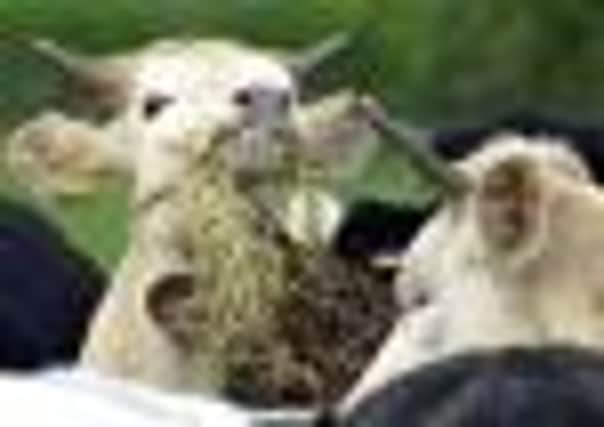PAP could be back in food chain


And some farmers see an opportunity to overcome public prejudice against the idea by selling it as a ‘green’ solution – substituting home-grown protein for imported soya.
But they might have to wait until other countries are already getting the advantage from so-called Processed Animal Protein, because of strong British resistance to the idea, stemming from the ‘Mad Cow’ panic of the mid-90s.
Advertisement
Hide AdAdvertisement
Hide AdThe European Parliament is due to vote next month on a set of recommendations which would clear the way for PAP in animal feeds for the first time since the panic measures against it which followed the UK discovery that Bovine Spongiform Encephalopathy had started with recycling scrapie-infected sheep into cattle feed. The proposed relaxation of the rules would not, initially at least, change the post-BSE rule against feeding meat products to ruminants, or any animal to its own kind.
But it would allow poultry protein to be fed to pigs and pig scraps to poultry, or either to fish, which are the three changes most wanted across Europe.
There would be no PAP from mixed sources, so the change would do nothing for the small remaining campaign in favour of pigswill made from mixed food scraps.
The hard-pressed pig sector has been discussing the pros and cons of PAP online and although many farmers are wary of public reaction, others are arguing that a rebranding of PAP could enlist public sympathy. The publisher of Pig World, Digby Scott, has suggested One Planet Protein. Other farmers are wondering if British pork could fetch a premium if guaranteed PAP-free.
Advertisement
Hide AdAdvertisement
Hide AdThe European Parliament vote will be followed by a UK government consultation and nothing will change until the watchdog authorities are sure they have reliable tests to detect PAP and identify its species of origin. Research has been going on for some years, however, and industry insiders say it is possible everything could be in place early in 2012.
The big question is whether the retailers will let the farmers even try any PAP-based products. It is a subject on which most of the players prefer to talk off the record. They doubt if UK supermarkets will move first but if other countries had cheaper products because of PAP – or better returns to farmers, because of fuller use of carcases – there would be serious consideration behind the scenes.
George Perrott, who liaises with the feed sector for the Agricultural Industries Confederation, said this week that fish farming might be the sector most open to the idea because it is already under pressure to prove its fishmeal-based feeds sustainable.
The meat processing industry finances FABRA, the Foodchain and Biomass Renewables Association, which says PAP could save 10 per cent of soya imports and would add value to by-products which are currently burnt for fuel if not required for pet foods or fertilisers.
Advertisement
Hide AdAdvertisement
Hide AdChief executive Stephen Woodgate said: “Some people would see it as a step backwards. But the products would be safe and rigorously tested – nothing like the 1980s, when essentially all animal proteins were all mixed up in all sorts of feeds. But everyone is being very cautious about consumer reaction.”
‘Make your mind up time’
RICHARD LONGTHORP, East Yorkshire pig farmer and a representative of the industry in various forums, said: “We have to increase food production and that and environmental sustainability, high animal welfare, consumer acceptability and low cost of production, are not always compatible.
“This is only one of a number of areas in which ‘make your mind up time’ is approaching for both industry and consumers. One thing that tends to get overlooked in the heat of the debate is that at the end of the day pigs are omnivores – they are designed to eat a varied but balanced diet and that includes animal tissue.”